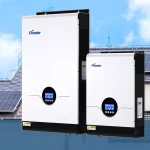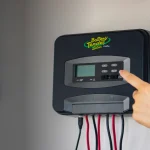What is the difference between hybrid Inverter and grid tie Inverter? Hybrid inverters and grid-tie inverters are both used in solar power systems, but they serve different purposes and have distinct features. Here’s a detailed comparison between the two:
What Is Hybrid Inverter
A hybrid inverter is a device that combines the functions of a grid-connected inverter and an off-grid inverter to handle power management for solar panels, battery storage systems and the grid.
Hybrid Inverter Key Features
- Battery Management: Ability to charge and discharge batteries and manage their energy storage.
- Off-grid capability: Ability to utilize the battery’s stored energy to power the battery and provide backup power in the event of a grid failure or power outage.
- Energy Management: Intelligently manages energy use in the home or facility, optimizing the use of solar, battery and grid power.
- Grid Tie Function: Excess solar power can be fed back into the grid, utilizing Net Metering to reduce electricity costs.
Advantages of Hybrid Inverter
- Flexibility: Ability to work in both on-grid and off-grid modes, providing a variety of application scenarios.
- Energy autonomy: Energy storage capability enhances autonomous control of power supply.
- Backup power: Provides backup power in the event of a grid outage, ensuring continuous power to critical equipment.
Disadvantages of Hybrid Inverter
- Higher cost: Usually more expensive than grid-connected inverters due to more features and more complex design.
- Complicated installation: requires professional installation, involving more components and more complex system design.
Applications of Hybrid Inverter
- Homes and commercial facilities that require backup power.
- Solar systems with battery storage needs.
- Areas with unstable power grids or frequent power outages.
What Is Grid Tie Inverter
A grid-tie inverter is a device that converts the direct current (DC) generated by solar panels into alternating current (AC) and delivers it directly to the grid.
Grid Tie Inverter Key Features
- Grid-connected function: Transmits the electricity generated by the solar power system to the grid, utilizing the Net Metering (NM) mechanism to reduce electricity bills.
- High Efficiency Conversion: Maximizes the use of solar power with high power conversion efficiency.
- No Battery Support: No support for battery storage systems, all excess power is delivered directly to the grid.
Advantages of Grid Tie Inverter
- Lower cost: Simple design, no battery management features, therefore lower price.
- Easy to install: relatively simple system, easier to install and maintain.
- Efficient use of solar energy: excess power is fed directly back into the grid, reducing electricity bills.
Disadvantages of Grid Tie Inverter
- No Backup Power: Cannot supply power in the event of a grid outage because there is no battery storage.
- Grid dependent: must be connected to the grid to work, not suitable for areas with unstable grid or no grid coverage.
Applications of Grid Tie Inverter
- Areas with stable and reliable power grids.
- Homes and businesses that wish to reduce their electricity bills through net metering mechanisms.
- Solar power systems that do not require backup power or battery storage.
Difference Between Hybrid Inverter And Grid Tie Inverter
| Hybrid Inverter | Grid Tie Inverter | |
| Battery management | Supports battery charge/discharge management | Battery management is not supported |
| Off-grid capability | Provide backup power in case of grid failure | Unable to supply power in case of grid failure |
| Grid connection function | Feedback of excess power to the grid | Feedback of excess power to the grid |
| Energy management | Intelligent management of solar, battery and grid power | Primary management of solar and grid power |
| Costs | Higher, more features | Lower, simple design |
| Installation complexity | Complex, involving batteries and more components | Simple, single system |
| Applicable scenarios | Areas requiring backup power, battery storage, unstable grids | Stabilized grid, no need for backup power |
Overall, hybrid inverters offer greater flexibility and autonomous energy management capabilities for users who require backup power and battery storage. Grid-tied inverters, on the other hand, are a more cost-effective and simpler solution for users with a stable grid and no need for backup power. The choice of inverter depends on the specific energy requirements, budget and grid conditions.



